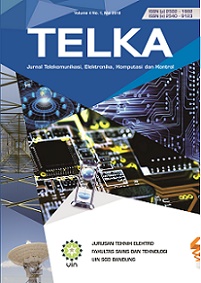|  |
Informasi
PENGUMUMAN |
|
| Tim Editor Jurnal TELKA mengundang akademisi, praktisi, dan umum untuk menyumbang artikel pada tiap terbitan. Kami menerima tulisan dalam ruang lingkup bidang ilmu Teknik Elektro, maupun studi-studi interdisipliner yang terkait. Bidang-bidang tersebut meliputi, antara lain: Telekomunikasi, Elektronika, Komputasi dan Kontrol. Panjang naskah adalah 4000-10000 kata. Naskah haruslah ditulis menurut kaidah penulisan ilmiah menggunakan template berikut dengan format doc/docx dan besar max 1 MB. Naskah dapat ditulis dalam bahasa Indonesia atau bahasa Inggris. Naskah dikirimkan melalui OJS jurnal TELKA. Tulisan-tulisan yang masuk ke redaksi diseleksi dengan sistem blind peer-review untuk menjaga obyektivitas sekaligus membuka kesempatan bagi setiap orang, terlepas dari latar belakang pendidikan mereka untuk berkontribusi. Atas perhatiannya, kami ucapkan terima kasih. |
|
| Dikirimkan: 2018-11-03 | |
| Lebih banyak informasi... |
Vol 10, No 3 (2024): TELKA
Daftar Isi
|
I Made Agus Mahardiananta, Cokorda Istri Dharmayanti, I Gusti Agung Ngurah Devasya Putra Pratama
Dilihat: Sari 152 kali
| PDF 27 kali
|
193-203
|
|
Ahmad Khumedillah Irfa'i, Ase Suryana, Resa Pramudita, Muhammad Adli Rizqulloh
Dilihat: Sari 83 kali
| PDF 33 kali
|
204-216
|
|
Toni Toni, Muhammad Arif Sulaiman, Mochamad Faisal Yoga Dewantara, Muh Wildan
Dilihat: Sari 56 kali
| PDF 19 kali
|
217-229
|
|
Kartika Sekarsari, Ojak Abdul Rozak, Ariyawan Sunardi
Dilihat: Sari 82 kali
| PDF 31 kali
|
230-239
|
|
Mauludi Manfaluthy, Brainvendra Widi Dinova, Muhammad Ridwan
Dilihat: Sari 53 kali
| PDF 28 kali
|
240-252
|
|
Y.B. Adyapaka Apatya, Wahyu Setiady, Eduardo Ardita
Dilihat: Sari 33 kali
| PDF 8 kali
|
253-263
|
|
Riyani Prima Dewi, Fadhillah Hazrina, Novita Asma Illahi, Putri Maya Maemunah
Dilihat: Sari 61 kali
| PDF 20 kali
|
264-271
|
|
Afrizal Yuhanef, Sri Nita, Riska Alfitri
Dilihat: Sari 100 kali
| PDF 38 kali
|
272-284
|















